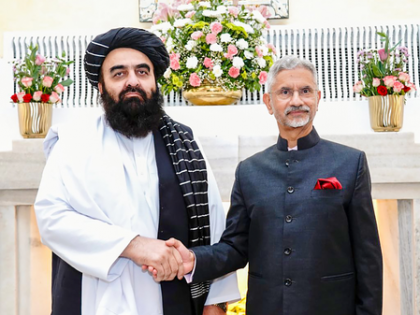Will the 'Kabuliwala' return with his ware of dry fruits through Chabahar Port?
By IANS | Updated: October 12, 2025 17:55 IST2025-10-12T17:53:16+5:302025-10-12T17:55:14+5:30
New Delhi, Oct 12 Afghanistan Foreign Minister Amir Khan Muttaqi exhibited a striking blend of strategic foresight and ...

Will the 'Kabuliwala' return with his ware of dry fruits through Chabahar Port?
New Delhi, Oct 12 Afghanistan Foreign Minister Amir Khan Muttaqi exhibited a striking blend of strategic foresight and cultural nostalgia –- whether advertently or not –- in his subsequent public interaction.
Addressing the media in New Delhi on Friday, his emphasis on Chabahar port as a "good trade route" reflects Afghanistan's intended move towards alternative routes amid strained ties with Pakistan.
The port, developed by India in southeastern Iran, offers the landlocked country a direct link to the Arabian Sea and beyond, bypassing Pakistan.
But the US has reimposed sanctions, ending earlier waivers, in an apparent bid to isolate Iran.
This sudden turn has raised immediate legal, banking and insurance obstacles for Indian and third country companies working at Chabahar.
"Chabahar is a good trade route. Afghanistan and India should try to remove the obstacles following sanctions imposed by the US. We can sort it out through negotiations between Afghanistan-India, and the US," Muttaqi exhorted, underscoring its potential to facilitate exports of dried fruits, saffron, and handicrafts to India and beyond.
That seemed to be in his thoughts, when the Minister, while interacting with Indian analysts and experts at an event organised by the Vivekananda International Foundation (VIF) on Saturday, referred to Rabindranath Tagore's Kabuliwala, striking a poignant chord with the audience.
"The conversation underscored the deep economic, historical, cultural, and civilisational ties between the two countries. His mention of Rabindranath Tagore's Kabuliwala struck a poignant chord with the audience," the New Delhi-based think tank VIF posted on X.
Muttaqi's reference to Tagore's 1892 tale of an Afghan dry fruit seller in Kolkata could have been an invocation of a shared cultural memory that has long shaped India-Afghan relations.
He referred to the story as "not fiction -- it is our history".
Coincidentally, the same day, Afghanistan's Ministry of Industry and Commerce had announced that the value of Afghanistan's dried fruit exports has significantly increased this year.
India, China, Pakistan, Russia, the UAE, Canada, Italy, and the UK are among the main destinations for these exports.
"In the first eight months of the current year, the value of dried fruit exports reached $222 million, whereas in the first eight months of the previous year (2024), this figure was $179 million," Afghanistan's Tolo News reported, quoting Ministry Spokesperson Akhundzada Abdul Salam Jawad.
However, the country's Dried Fruit Exporters Union told Tolo News that traders continue to face serious challenges in the export process.
The closure of Pakistan border crossing, where a fierce battle is currently razing, high air freight costs, and problems with money transfers are major obstacles to dried fruit exports.
Officials in Kabul warn that if these issues are not resolved, there is a risk of losing key markets such as India.
As Kabul navigates through uncertain waters, dry fruits may seem like a small stake –- but carry memory, identity, and hope.
In Tagore's story, little Mini asked, "Kabuliwala, O Kabuliwala, where have you gone?" Now, through Chabahar, he may try to return.
Disclaimer: This post has been auto-published from an agency feed without any modifications to the text and has not been reviewed by an editor
Open in app